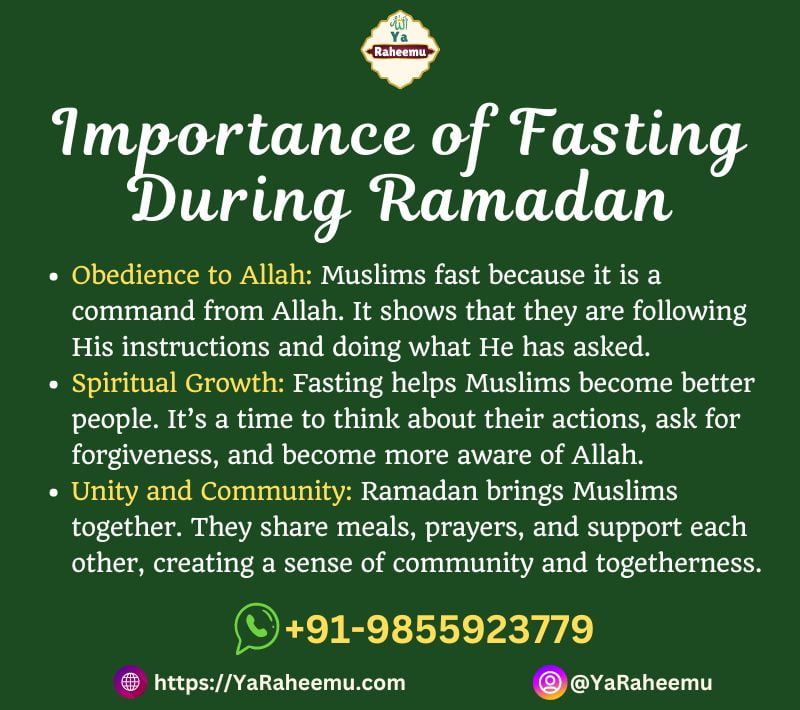Fasting during Ramadan is one of the Five Pillars of Islam, which means it’s a very important part of being a Muslim. During this special month, Muslims fast from sunrise to sunset. This means they don’t eat or drink anything during the day. Fasting is not just about skipping meals; it’s a special time for Muslims to grow closer to Allah, improve themselves, and feel gratitude for the things they have. Let’s explore why fasting is so important and the many benefits it brings.
Islamic Fasting and Its Benefits
Islamic fasting, particularly during the holy month of Ramadan, is one of the Five Pillars of Islam and a significant practice for Muslims worldwide. Fasting involves abstaining from food, drink, and other physical needs from dawn until sunset.
This practice is not just about physical restraint but also about spiritual enrichment. It helps Muslims develop self-discipline, enhance their closeness to Allah, and increase their empathy for those less fortunate.
The Importance of Fasting During Ramadan
Fasting during Ramadan has several important reasons:
- Obedience to Allah: Muslims fast because it is a command from Allah. It shows that they are following His instructions and doing what He has asked.
- Spiritual Growth: Fasting helps Muslims become better people. It’s a time to think about their actions, ask for forgiveness, and become more aware of Allah.
- Unity and Community: Ramadan brings Muslims together. They share meals, prayers, and support each other, creating a sense of community and togetherness.
Spiritual Benefits of Fasting
Fasting has many spiritual benefits:
- Closer to Allah: By fasting, Muslims show their devotion to Allah. It’s a way to strengthen their relationship with Him and seek His blessings.
- Self-Reflection: Fasting gives Muslims time to think about their lives and actions. It helps them focus on improving their behavior and being more grateful.
- Increased Worship: During Ramadan, Muslims pray more and read the Quran. This increased worship helps them feel closer to Allah and more spiritually fulfilled.
If you want to stay connected with Allah and keep your faith strong, make sure to pray five times a day. Salah helps you stay focused and grateful.
If you have any questions or need further clarification, feel free to reach out to Molvi Ji for assistance.
Physical Benefits of Fasting
Fasting is also good for the body:
- Detoxification: When Muslims fast, their bodies get a chance to clean out toxins. This helps the body stay healthy and function well.
- Improved Digestion: Fasting can give the digestive system a rest, which can lead to better digestion and overall health.
- Balanced Weight: Fasting can help control weight by reducing overeating and promoting healthier eating habits.
Moral and Emotional Benefits of Fasting
Fasting has important moral and emotional benefits:
- Self-Control: Fasting helps Muslims practice self-discipline. They learn to control their desires and avoid things that are bad for them.
- Empathy and Compassion: By fasting, Muslims understand what it feels like to be hungry. This helps them feel more empathy for those who are less fortunate and encourages them to help others.
- Gratitude: Fasting makes Muslims more thankful for the food they have and the blessings in their lives. It reminds them to appreciate what they often take for granted.
How to Prepare for Ramadan
Getting ready for Ramadan can make the fasting experience better:
- Adjust Your Routine: Before Ramadan starts, try to gradually adjust your eating and sleeping patterns to make the transition easier.
- Plan Your Meals: Plan balanced meals for suhoor (pre-dawn meal) and iftar (meal to break the fast) to keep your energy levels up.
- Stay Hydrated: Drink plenty of water during non-fasting hours to stay hydrated.
To understand the basics of being a good Muslim, learn the Five Pillars of Islam. They are the key practices that guide your faith and actions.
3 Common Questions About Fasting
Here are answers to some common questions about fasting:
- Can Children Fast? Children are not required to fast until they reach puberty. However, some may choose to fast for shorter periods as a way to prepare.
- What If I’m Sick? If you’re sick or have a health condition, you’re allowed to skip fasting and make up the missed days later. Always consult a healthcare provider.
- Can I Still Exercise? Light exercise is fine, but it’s important to listen to your body and avoid strenuous activities during fasting hours.
If you need gentle help and relief during tough times, recite “Ya Latifu Meaning.” This name of Allah brings kindness and ease into your life.
Conclusion
Fasting during Ramadan is a special and meaningful practice for Muslims. It’s a time to grow spiritually, improve physically, and develop moral strength. By fasting, Muslims show their love for Allah, learn self-control, and become more compassionate towards others. Ramadan is not just about abstaining from food and drink; it’s a chance to become a better person, both inside and out. Embrace this blessed month with a full heart, and you will find countless benefits in both this life and the hereafter.
If you want to feel closer to Allah and receive His blessings, use the 99 Names of Allah in your prayers. They bring you His guidance and mercy.

